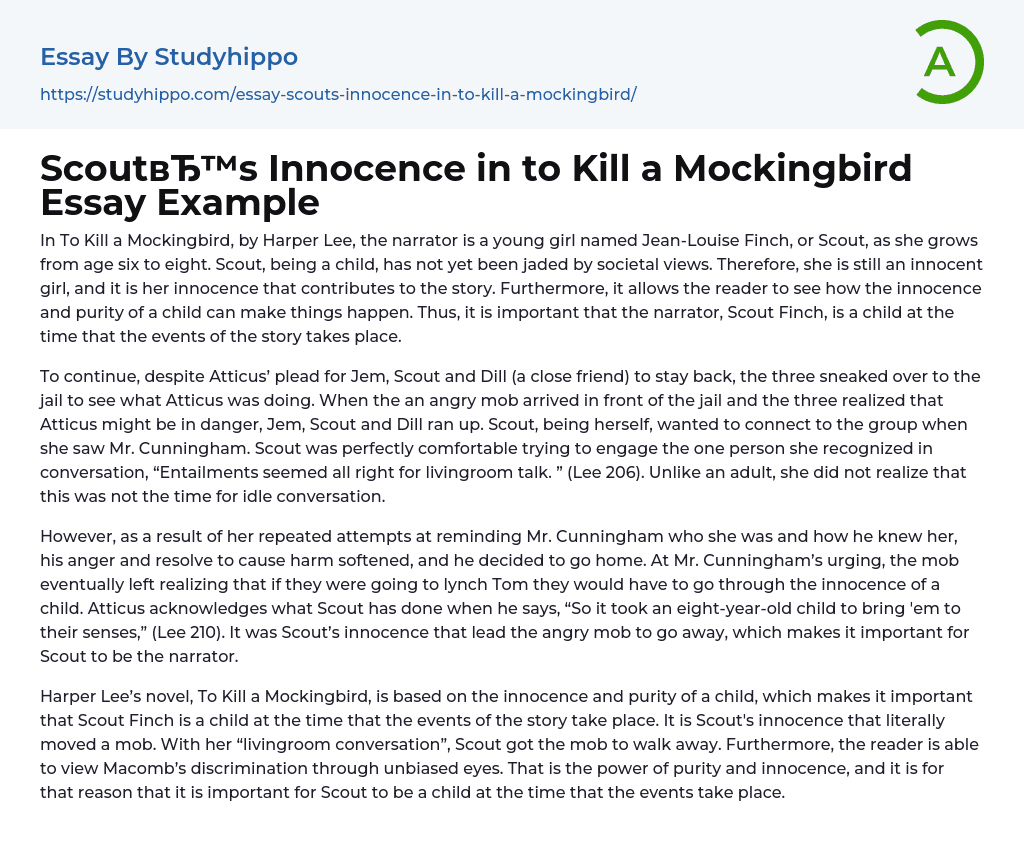In To Kill a Mockingbird, by Harper Lee, the narrator is a young girl named Jean-Louise Finch, or Scout, as she grows from age six to eight. Scout, being a child, has not yet been jaded by societal views. Therefore, she is still an innocent girl, and it is her innocence that contributes to the story. Furthermore, it allows the reader to see how the innocence and purity of a child can make things happen. Thus, it is important that the narrator, Scout Finch, is a child at the time that the events of the story takes place.
To continue, despite Atticus’ plead for Jem, Scout and Dill (a close friend) to stay back, the three sneaked over to the jail to see what Atticus was doing. When the an angry mob arrived in front of the ja
...il and the three realized that Atticus might be in danger, Jem, Scout and Dill ran up. Scout, being herself, wanted to connect to the group when she saw Mr. Cunningham. Scout was perfectly comfortable trying to engage the one person she recognized in conversation, “Entailments seemed all right for livingroom talk. ” (Lee 206). Unlike an adult, she did not realize that this was not the time for idle conversation.
However, as a result of her repeated attempts at reminding Mr. Cunningham who she was and how he knew her, his anger and resolve to cause harm softened, and he decided to go home. At Mr. Cunningham’s urging, the mob eventually left realizing that if they were going to lynch Tom they would have to go through the innocence of a child. Atticus
acknowledges what Scout has done when he says, “So it took an eight-year-old child to bring 'em to their senses,” (Lee 210). It was Scout’s innocence that lead the angry mob to go away, which makes it important for Scout to be the narrator.
Harper Lee’s novel, To Kill a Mockingbird, is based on the innocence and purity of a child, which makes it important that Scout Finch is a child at the time that the events of the story take place. It is Scout's innocence that literally moved a mob. With her “livingroom conversation”, Scout got the mob to walk away. Furthermore, the reader is able to view Macomb’s discrimination through unbiased eyes. That is the power of purity and innocence, and it is for that reason that it is important for Scout to be a child at the time that the events take place.
- Book Summary essays
- Metaphor essays
- Reader essays
- Rhyme essays
- Literary devices essays
- Villain essays
- Books essays
- Genre essays
- Literary Criticism essays
- Writer essays
- Protagonist essays
- Simile essays
- Poem essays
- Book Report essays
- Book Review essays
- Greek Mythology essays
- Plot essays
- Tragic Hero essays
- Coming of Age essays
- Play essays
- Rhetoric essays
- Rhetorical Question essays
- Translation essays
- Understanding essays
- Reason essays
- Character essays
- Letter essays
- American Literature essays
- Literature Review essays
- Utopia essays
- Poetry Analysis essays
- Dante's Inferno essays
- Between The World and Me essays
- Incidents in The Life of a Slave Girl essays
- Flowers for Algernon essays
- Myth essays
- Everyday Use essays
- Boo Radley essays
- Genesis essays
- Richard iii essays
- Alice in Wonderland essays
- On the road essays
- Ozymandias essays
- The Nightingale essays
- Holden Caulfield essays
- Animal Farm essays
- 1984 essays
- A Hanging essays
- Shooting An Elephant essays
- A Tale Of Two Cities essays




